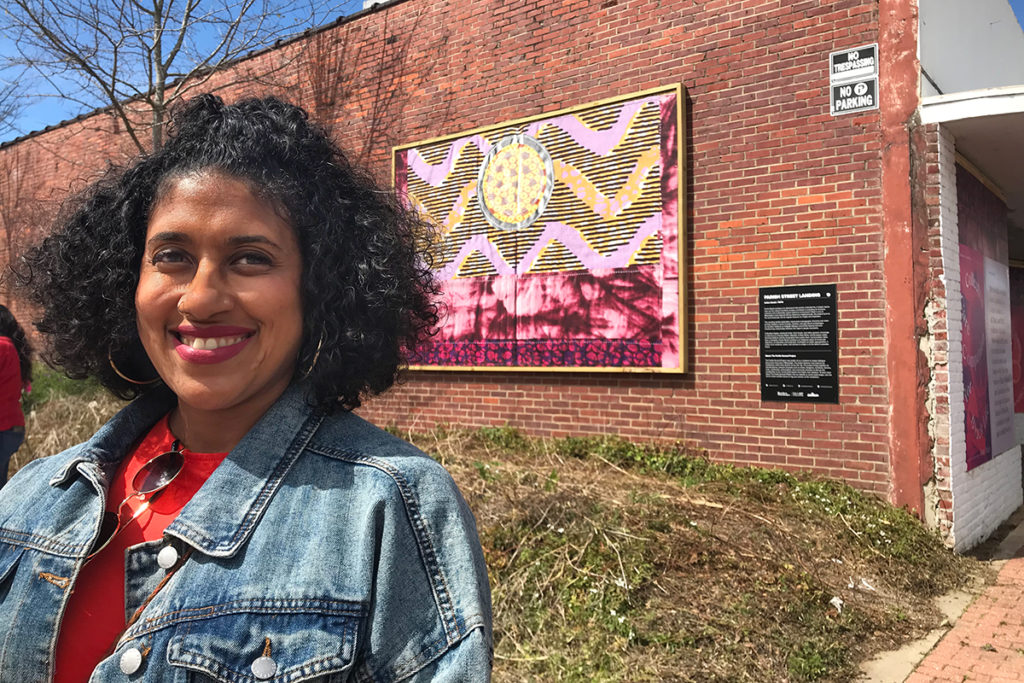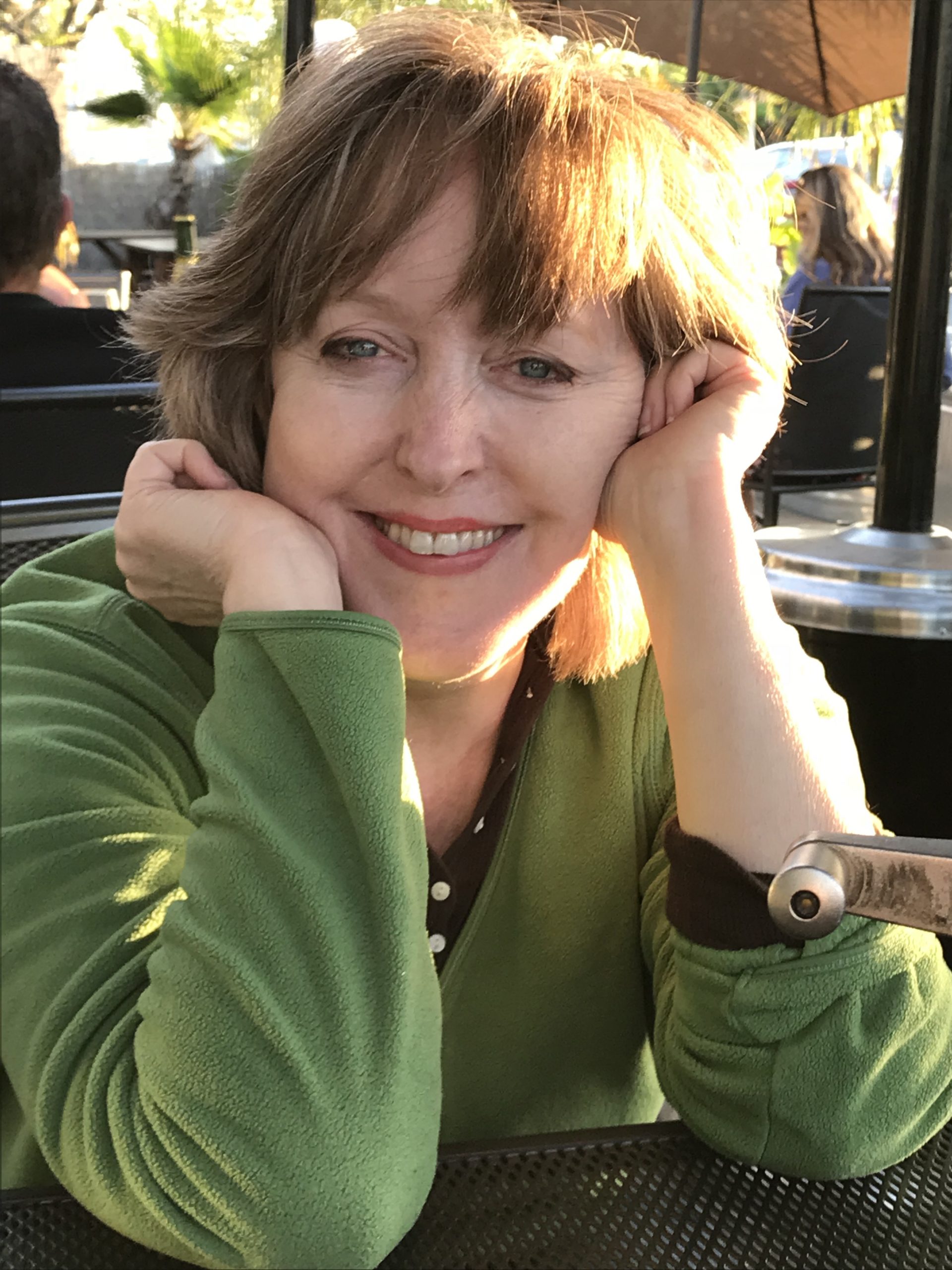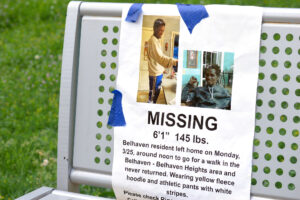Storefront windows along the 200 block of Jackson’s Farish Street turn a page on the historic neighborhood, once the mecca for Black businesses in the state. Brightened with artwork and
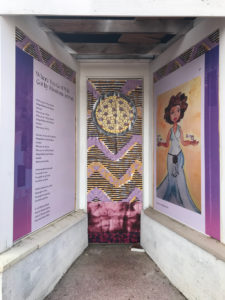
threaded with poems, shared wisdom and messages of self-care, storefronts formerly covered in plywood now actively engage passersby on the sidewalk and street. Creators hope that all those who see and read the content take it in and take it home, especially those who need it.
The installation is a companion piece in a year-long project of Mississippi Museum of Art’s Center for Art and Public Exchange, or CAPE, with national artist-in-residence Shani Peters leading the charge. Focusing on the support and celebration of Black mothers and caretakers, the public display mirrors the 46-page booklet, “Collective Care Companion for Black Life,” published and distributed at Jackson Black businesses, wellness spaces and at the art museum as part of the collaborative project.
“The whole idea for the project is to recognize Black mothers and caretakers as the experts in Black wellness and care that they are,” Peters says. “To respect that knowledge and wisdom, we’ve very intentionally and specifically collected wisdom and insight from Black mothers and caretakers here in the city and poured them into this book.
“Black mothers and caretakers are taking care of the whole community all the time, so their wisdom and insights benefit us all. Always has, right?” Peters continues. Honoring that wisdom and effort, and giving care back to the caregivers are key, he adds. “This is just another way to kind of get it on paper and make it more accessible.”
Organizers printed and distributed 1,000 free copies of “Collective Care Companion for Black Life” around the capital city. “I hope people grab a book, most of all,” Peters says. The organization blew up and mounted contents on the storefront window spaces and doors on the 200 block on Farish Street. “You can literally walk down the street and read the whole book’s contents.”
The booklet, intended as a practical, day-to-day resource to Black and Brown residents of Jackson and beyond, includes ways to navigate daily life, minimizing pain and multiplying joy. Its centerspread and surrounding pages pulse with images from a quilted book Peters created of an abstracted sun, rising and setting against a background of vibrantly patterned fabrics.
“The idea is that you breathe in as it rises, and exhale as it sets,” Peters says. “We need all the reminders we can get, to come back to a place of stillness.”
On Farish Street, the image of Peter’s rising sun calls onlookers’ attention to the side of a building marking the start of the installation; design motifs from the quilts stitch the content together as viewers progress along the outdoor display. The in-house design firm of The Black School, which Peters co-directs with her husband, Joseph Cuillier, in New Orleans, designed the book and display.

Peters began with a core group of eight Jackson women who support families and whose careers are key stakes in the Jackson community. Their networks helped with an exponential outreach to more women in the community, tapping deep into a well of lived experience and coping skills, and connecting with those who could directly benefit.
The project also tangibly spoke to the care of the community in its sights, Peters says, delivering 50 care packages that included fresh produce from Foot Print Farms, bath and body-care products from Magnolia Sunset Markets, and a gift card to Kroger.
Research showing that the country’s Black population ranks among the lowest across indicators of well-being—and in Mississippi, among the most vulnerable and underserved—spurred the project’s lessons to share insights on navigating Black life, personally and in community. Findings from experiences with care packages and questionnaires fed into the booklet’s content, which includes meditations, grounding lessons, a healthful recipe, personal skills on healing from loss, communicating with and interacting with children, partners, extended family, coworkers, among other topics.
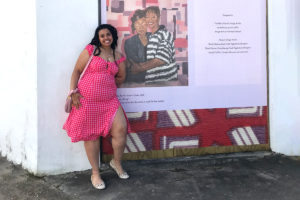
“It’s beautiful. It’s more than we could have envisioned,” CAPE Managing Director Monique Davis says as she takes in the display on Farish Street during an in-person interview with the Mississippi Free Press. “I hope people have time to sit with it, and be fed by it. … I’m just so happy that we can share this in the community, and on a traditionally, historically Black street and be part of the revitalization and hopefully build energy on this block.”
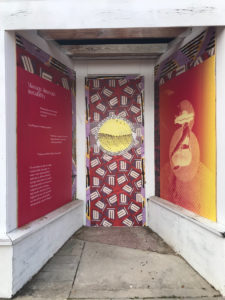
A display on Farish Street, a storied neighborhood that the long-delayed promise of rebirth challenged, was part of the project’s plan from the outset. “We kind of always knew that this was where it was going to live. … We thought this would be a really good, organic art-based activity to have here,” Davis says.
Monique Davis’ illustration of a womanly figure, both goddess-like and relatably human with the words “You are divine” adds a visual splash in the booklet and the installation. “In Her Arms,” a painting that Ava Jeanne Davis (her daughter) created of the two of them in an embrace, is another bright spot, featured at the end. Ava Davis, a Tulane student who worked with Peters in New Orleans, says, “She thought that it was perfect to represent the theme of this project.”
A gathering of dozens greeted the unveiling on a recent sunny Saturday, as people dropped by to take photos, see the artwork and interact with artists. Monique Davis can see the installation continuing to draw interest and viewers on pleasant afternoons, after church at nearby Central United Methodist Church, as they patronize area businesses such as Marshall’s Music and Book Store, Herbal Blessings or Big Apple Inn, or even at night as they head to F. Jones Corner for music on the next block.
“This could be the next walkable part of Jackson,” she says.
Though the project focuses on the Black community, the shared wisdom is accessible to all.
“I think anybody can relate to ways to care for themselves, to slow down, to take time to reflect. That just connects us as human beings,” Monique Davis says. “I just think that Black people have additional hurdles, additional obstacles, just because of our experience in the United States and inequities that exist in the system. But, anybody could benefit from exercise in the morning, having a cup of tea and benefiting from some of the wisdom that was shared and some of the poems. That part is kind of universal.”
“It is a love letter to Black women, to say, ‘Really, stop—you don’t have to be that super-strong person all the time,’” Davis concludes. “And, some of that is really killing us, in a way.”


